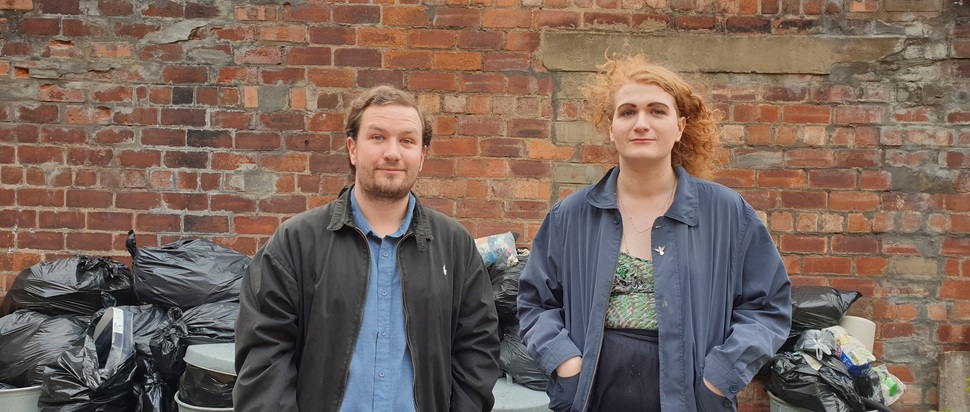Glasgow's Comfort on gender identity and class disparity
Ahead of their appearance at Counterflows, we speak to Glasgow-based duo Comfort about using honesty in their lyrics to challenge gender identity and class disparity
The idea of 'passing' as cis for a binary trans person, and especially transgender women, is to have a society uncomfortable with your mere existence impose standards that should have long ago started gathering dust. Natalie McGhee, who makes thunderous, kinetic music that wriggles away from easy definition with her brother Sean in the band Comfort, channels an honesty and resoluteness into lyrics about her life as a trans woman and the persistent dismissal and disrespect of gender non-conforming people.
“So many of my negative experiences came out of not passing and being visibly trans,” she explains, sitting across from her sibling and musical partner. “I want to show people that I don't really give a shit what you think about me. It's not about whether someone in the pub feels uncomfortable about being sat down the bar from me. I don't care how I look; I know I’m not cis passing all the time. It used to bother me for a long time, but now I’m like why should I have to erase all these parts of me just to fit in and lose a part of who I am. I think I look great, and I'm proud to say so.”
It’s a sentiment that is explicit and urgent on the duo’s 2019 album Not Passing. This relatively brief and austere record packs a considerable punch. Gurgling, rubbery electronics warble underneath Sean’s drumming, which is somehow both taut and skittering. Natalie’s vocals are roared unflinchingly in your face. She can sound pained, dejected, triumphant and oratorical all at once. Comfort mix abrasion with beauty, beats and vocals tangling in interlocking rhythms. It makes sense when they explain their greatest influence isn’t punk or noise-pop, but hip-hop.
Natalie’s delivery is never calmed, and so not always easy to follow, which makes the meaning and emotion behind her words even more essential. 'Voyeurs come, rabid and spray / I don’t get what it is you’re supposed to be... / They don’t know if it’s okay to fancy me', she declaims on the title track. In a note accompanying the record, she could not be any clearer: “My womanhood needs no permission.”
Originally from Aberdeen, Natalie and Sean, in their late 20s and early 30s respectively, have been thinking creatively together all their lives. But it wasn’t until 2017 that they began playing shows, and released a mini-album called Built to Waste. It contained the basic components of their music now, but the production was warmer, dialled down, and Natalie didn’t quite know what she wanted to say yet.
“I guess when writing is such a vulnerable process, you’re putting part of yourself out there to be judged,” says Sean about their evolution since then. “As time went on, we became more confident and we knew that we wanted to do something that really encapsulated our beliefs and had our own identity. The bond we have has let us push everything a bit further.”
Natalie adds: “I wasn’t comfortable in myself yet, and I hadn't been out for long, so I didn’t know if I could be that honest. But I realised if I could do it I should, because it would help for that honesty to exist and for other people to hear it. I figured if you’re going to write politics, you should relate it to your own life. And since making that decision, I have a stronger belief that it doesn’t matter if I’m poetic or angry – I just need to be honest.”
Class disparity is another social injustice close to their heart, touching on it in the tumbling track … promises to heal divisions. “It makes a big difference,” agrees Sean. “If you have a great education as a teenager, you believe genuinely you can do whatever you want to. On the other side, you struggle. You're pushed through the system. And it takes years to build that confidence back up, if you ever do. You don't feel like you can do anything – do art, make big statements. A lot of people never do. It’s a real shame.”
The pair are quick to praise the Glasgow music scene they’re now a part of, not only in how it has supported them artistically – they worked with Kay Logan, aka Helena Celle, to produce the album, which was put out by local label Anxious Music – but also its work to establish inclusive spaces and lift up marginalised voices. Next month they bring their restless, polemic art to Counterflows, a festival that embraces music that pushes boundaries.
They are also refreshingly direct about all that still needs done to move forward in Scotland – a country which celebrates its progressiveness and yet enables notable figures in politics and the media who are transphobic. “I'm not interested in being part of that,” says Natalie. “We'll make our own thing and be better than them. That's what the people who are looked down upon always do.”
Comfort play Nice N Sleazy, Glasgow, 11 Mar; The Old Hairdressers, Glasgow, 14 Mar; Counterflows, Glasgow, 3 Apr
comfortglasgow.bandcamp.com
Counterflows runs across various venues in Glasgow from 2-5 Apr
counterflows.com
